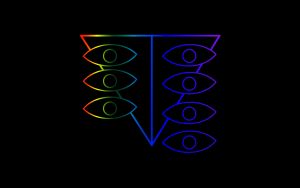Seele: Difference between revisions
ElMariachi (talk | contribs) No edit summary |
m (reverted page heading) |
||
| Line 42: | Line 42: | ||
=== Monolith Patterns === | === Monolith Patterns === | ||
In | In Rebuild. the monoliths no longer appear as solid black, and instead sport two patterns. In Evangelion [[Evangelion 1.0|1.0]] and [[Evangelion 2.0|2.0]], the monoliths show the same speckled moving patterns as those seen in [[core|cores]] in the new films. Later in [[Evangelion 3.0]], the more silent monoliths sport a moving holographic pattern. It is unknown if this shift in design reflects a change in status of Seele or not. | ||
{{Rebuildcontentend}} | {{Rebuildcontentend}} | ||
{{-}} | {{-}} | ||
Revision as of 02:31, 24 March 2014

|
"You are free to examine the Magi's data recorders. There is no record of any such incident." |
 |
Seele (German: soul) is a shadowy and mysterious organization which maintains a global power cabal, and is the secret backer of Gehirn and Nerv. The Seele council members are the true puppet masters pulling the strings of the United Nations.
The council
The Seele council is composed of 12 members[1], headed by Chairman Keel Lorenz. Seele meetings consist of "video conferences" in which instead of projecting actual images of each member, images of large stone monoliths with the words "SEELE (member number) SOUND ONLY" displayed on them (i.e. Chairman Keel is "SEELE 01 SOUND ONLY").
Apparently the inner circle of Seele is the Human Instrumentality Committee, which directly oversees the progress of Nerv, officially in the name of the United Nations (which it actually controls). The committee is composed of five members, and is also headed by Chairman Keel.
History
The origins of Seele are shrouded in mystery. According to themselves, they have maintained an Illuminati-like power cabal over Earth's governments since ancient times. While this can not be independently confirmed, it is certain that Seele has been active since at least the end of World War II, when they acquired the Dead Sea Scrolls.
Plans
Seele intends to complete the Human Instrumentality Project by intentionally initiating the Third Impact.
In the original series and End of Evangelion, Seele's exact motives are not clear. It is repeatedly stated that Instrumentality will break down the A.T. Fields separating individuals and cause all humans to merge into a single existence. In the End of Evangelion, Seele state that they do not intend to use Eva as a "private Ark", presumably to ride out Third Impact and return later. Unlike Gendo and Fuyutsuki, Seele intend Instrumentality to last forever.
NGE 2
Seele's objectives are greatly expanded upon in the game Neon Genesis Evangelion 2. The Classified Information and the Seele ending of the game discuss a very different form of Instrumentality than seen in the series - Seele intend for Instrumentality to only be for their own council members. Rather than forming a sea of LCL, Seele wish to be merged inside an Evangelion unit with its own S² Engine, after destroying the Spear of Longinus. By placing their own souls within the body of a godlike being, and destroying the only weapon that can harm the body, they would effectively create an immortal God with human soul which would represent the pinnacle of human existence.
In Evangelion New Theatrical Edition
 |
Seele return in the new Theatrical edition of Evangelion. Appearing solely as disembodied monolith's, the lead Monolith is still voiced by Mugihito (Chairman Keel), but there is no Committee organisation present. The Monoliths not only converse with Gendo via holographic projection, but also with Kaworu when he wakes on the moon at the End of Evangelion 1.0.
While ostensibly working with Seele, Gendo and Fuyutsuki still appear to be secretly working against their plans. Gendo states that the two will rewrite Seele's scenario.

In Evangelion 3.0, the Seele monoliths appear again in a slightly altered form, having apparently remained silent for some time. Towards the end of the film, Gendo gives the Monoliths a farewell speech, as Fuyutsuki deactivates them one by one. As the last "Keel" monolith is about to be deactivated, it proclaims that all is well, and that they wish for the purification of all souls in Instrumentality.
Monolith Patterns
In Rebuild. the monoliths no longer appear as solid black, and instead sport two patterns. In Evangelion 1.0 and 2.0, the monoliths show the same speckled moving patterns as those seen in cores in the new films. Later in Evangelion 3.0, the more silent monoliths sport a moving holographic pattern. It is unknown if this shift in design reflects a change in status of Seele or not.
Notes
- The use of monoliths as representatives of Seele is regarded as an homage to the evolution inducing monoliths from 2001: A Space Odyssey. In the novels, the monoliths were built by a race of beings who had transferred their consciousnesses to machines.
References
- ↑ However, in the Director's Cut scene added to Episode 24 of Kaworu conversing with the monoliths at the lake, 15 Seele council monoliths are are shown (a monolith displaying "Seele 15" is even clearly visible). The reason for this discrepancy is not clear, and the scene itself seems surreal. See Episode 24' Analysis for analysis of this scene.
| Organizations |
| Seele | Gehirn | United Nations | IPEA | JSSDF | Wille | Kredit |
| Special Agency Nerv: |
| Nerv Headquarters | Nerv 1st Branch | Nerv 2nd Branch | Nerv 3rd Branch |
| Nerv 7th Branch (Tabgha Base) | Bethany Base | Golgotha Base |
